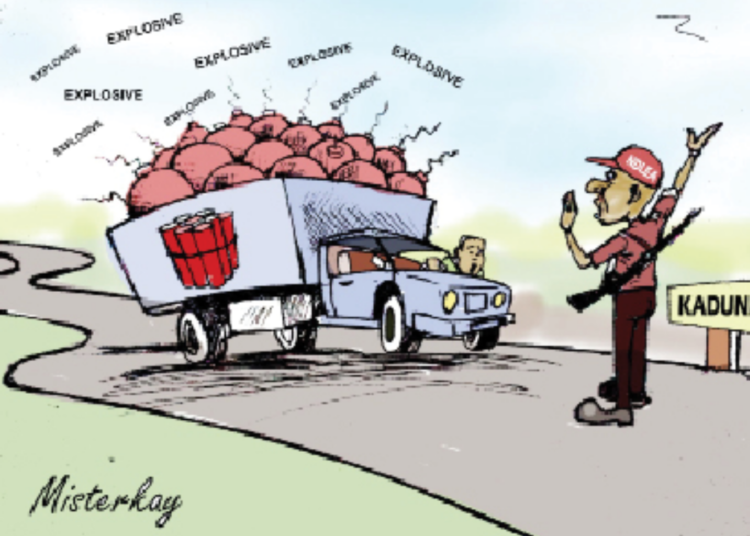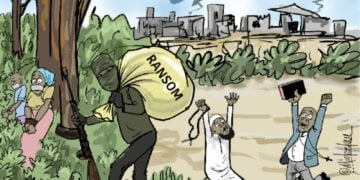Recently, the National Drug Law Enforcement Agency (NDLEA) intercepted a 33-year-old Oluwagbenga Leke along Mokwa-Jebba road in Niger state with about 400 pieces of Improvised Explosive Devices (IEDs) enroute to Kaduna. Leke claimed that the explosives were handed to him at a park in Ibadan, Oyo State, for delivery in Kaduna State, apparently with the sole aim of creating havoc, killing and destroying properties.
Curiously, the anti-drug agency handed over the suspect to the military authorities in Niger State, a development that has left a bemused Nigerian populace wondering if the military has the ‘time and patience’ to do due investigation. It quickly brings to mind instances where caches of arms are intercepted with arrests made, yet no reported cases of prosecution. One of such is the interception of a truck-load of ammunition heading to Anambra in July this year.
Fundamentally, this is suggestive of the danger ahead, considering the large number of illicit small arms and light weapons currently in circulation. Part of the government’s response to the worrisome trend was the establishment of the National Centre for the Control of Small Arms and Light Weapons in 2021, but whether the Centre has what it takes to ensure a weapon-free Nigeria is another cause for concern altogether.
The use of IEDs by non-state armed groups and criminals is spreading at an alarming proportion, with civilians as the target. The intent is to achieve a maximum effect in terms of murder and disruption.
According to the United Nations Office for Disarmament Affairs, attacks with IEDs occur globally on a scale of hundreds per month. Such attacks kill thousands every year, inflict grievous physical injuries and damage critical infrastructure. Data by Action on Armed Violence (AOAV) indicated that incidence of IED explosions in Nigeria has increased astronomically since 2010, with higher numbers of civilian casualties.
AOAV recorded 406 incidents of such explosions in over a decade, with 3,713 killed and 5,747 injured. In 2022, Nigeria ranked among the five most affected countries-Afghanistan, Pakistan, Somalia and India- as far as incidents of IED explosions are concerned.
Kaduna as a killing field?
Kaduna state has had its fair share of threats to security of lives and property, with scores killed and communities displaced. Recently, bandits killed a seminarian, Na’aman Danlami, when they attacked and razed the parish house at St. Raphael Parish at Fadan Kamantan, Kafanchan Diocese in Kaduna.
In the first quarter of 2023, about 214 people were killed, either in attacks by terrorists, communal clashes, or reprisals, in the state. Within the period, 746 were kidnapped. In May 2023, a suspected terrorist blew himself up with an IED to evade arrest when security operatives closed in on him in Keke community along Ibrahim Haske Road, Kaduna Millennium City.
In November 2022, two persons were killed in a landmine attack in Chikun local government area of Kaduna State. The victims’ vehicle drove over a landmine obviously planted by terrorists at Zangon Tofa. In March 2022 an IED detonated at Hayin Danmani village in Igabi LGA of the state, injuring two persons and damaging a building.
Although incidences of IED attacks are widespread in the state, no one can tell if Kaduna is the final destination of the explosives seized from Leke.
Northwest in dire straits
But the threat to security of lives and property is not peculiar to Kaduna State alone. It cuts across part of the Northwest, with Zamfara, Kaduna and Katsina States taking the lead as the worst hit.
Despite concerted efforts, residents of some communities in these states have been contending with serious threats to lives and properties from terrorists who repeatedly attack rural areas.
In Katsina State, for instance, residents of some communities in Sabuwa, Faskari, Danmusa and even Safana local government areas have been facing sustained attacks by terrorists who also kidnap people for ransom. Just last week, there were media reports on the gruesome murder of seven people and the abduction of 12 others by these terror elements who attacked the Doka community at Sabuwa local government area of the state.
Needless to say, these wanton killings and destruction of properties by terrorists and other criminal elements who have unrestrained access to illicit small arms and light weapons are worrisome.
Undeniably, statistics of killings and abductions for ransom in the Northwest states of Kaduna, Katsina, Zamfara, and Sokoto are startling. To end these killings, and other criminal activities that have made farming practically impossible in these states where agriculture is the mainstay of the economy, the government must frontally combat the proliferation of illicit weapons.
More than anything, the increasing threat to peace and security of lives and property in Kaduna and other states in the Northwest makes it imperative for the security operatives to uncover those behind the Kaduna-bound IEDs. They must do this by meticulously finding out who Leke runs errands for and bringing them to book in an open and transparent manner.





